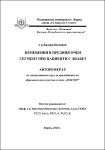I hereby declare that I will use the electronic library contents in compliance with COPYRIGHT AND RELATED RIGHTS ACT, Article 24, paragraph 1, item 9, only for scientific, cultural and educational purposes, without commercial gain, without commercial interest and non-profit.No Yes
Changes in the anterior segment of the eye in patients with diabetes / Промени в преден очен сегмент при пациенти с диабет
Abstract
Дисертационният труд сравнява микроструктурните характеристики на роговица в норма и при пациенти с диабет, като се използват съвременни технологични методики за микроструктурен анализ.
Диабетът е едно от основните предизвикателства за общественото здраве на 21 век и от мнозина се счита за глобална епидемия. Разпространението на диабета за всички възрастови групи в целия свят е 2,8% през 2000 г. и 4,4% през 2030 г. Диабетът води до намаляване на зрителната острота, оток на лещата и увреждане на ретината. Сензорната инервация на роговицата е основен фактор за здравето на епитела. Резултатите от редица изследвания показват, че плътността на роговичните нерви е намалена при пациенти с диабет тип 1. Но в последните години се установява, че и двата типа диабет са свързани с намаляване на плътността на роговичните нерви, както и с други аномалии на нерва. Ранното откриване на всякакви промени в биометрията на предния очен сегмент ще помогне за ранната намеса и ще осигури ефективно лечение с цел намаляване на риска от загуба на зрението. Конфокалната микроскопия на роговицата е бърз и неинвазивен метод за количествено определяне на дегенерацията на роговичните нервни влакна и потенциалната регенерация. Този метод на изследване е средство за ранно откриване, определяне и количествено оценяване на нервните увреждания при пациенти с диабет и за оценка на ефикасността на прилаганата терапии.
Цел: Определяне на микростуктурните характеристики в преден очен сегмент при пациенти с диабет, с помощта на съвременните методи за микроструктурен анализ и сравняване на промените с характеристиките на здравата роговица. We compare the microstructural characteristics of the cornea in healthy controls and in patients with diabetes, using modern technological methods for microstructural analysis.
Diabetes is one of the significant public health challenges of the 21st century and is considered by many to be a global epidemic. The prevalence of diabetes for all age groups worldwide is 2.8% in 2000 and is expected to be 4.4% in 2030. Diabetes leads to decreased visual acuity, lens oedema, and retinal damage. Sensory innervation of the cornea is a significant factor in the health of the epithelium.
The results of a number of studies show that corneal nerve density is reduced in patients with type 1 diabetes. Although, in recent years, both types of diabetes are associated with decreased corneal nerve density and other nerve abnormalities. Early detection of any changes in the biometrics of the anterior segment of the eye will help with early intervention and provide effective treatment by reducing the risk of vision loss.
Early detection of any changes in the biometrics of the anterior segment of the eye will help with early intervention and provide effective treatment to reduce the risk of vision loss. In vivo laser scanning confocal microscopy of the cornea is a rapid and non-invasive method for quantifying corneal nerve fibre degeneration and potential regeneration. This research method is a tool for early detection, identification, and quantification of nerve damage in patients with diabetes. Second, it provides an assessment of the effectiveness of the applied therapies.
Aim of thesis: Determination of microstructural characteristics in the anterior segment of the eye in patients with diabetes, using modern methods for microstructural analysis and comparison of changes with the characteristics of a healthy cornea.

